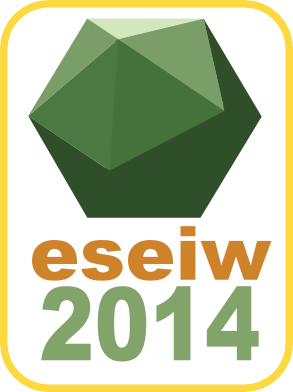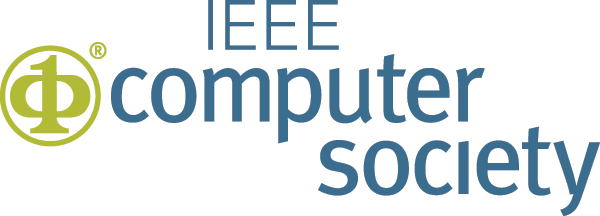isern 2014 - Open Space Sessions
Community-Supported EMSE Knowledge Building based on SLR Evidence
Organizer: Stefan Biffl, Marcos Kalinowski, Dietmar Winkler
Abstract:
Empirical software engineering (EMSE) researchers conduct systematic literature reviews (SLRs) to build bodies of knowledge (BoKs). Unfortunately, valuable knowledge collected in the SLR process is publicly available only to a limited extent, which considerably slows down building BoKs incrementally.
Workshop goal: Make the knowledge collected in EMSE Systematic Literature Reviews better available to the research community.
Make experiment results and materials better available to the EMSE research community.
Plan for continuing the work beyond the ISERN session: Setting up knowledge base instances for collecting evidence on specified topics in the EMSE research community, e.g., software quality, UML, pair programming.
Further information:
Experimental Evaluation Of Capability-Driven Design Methods
Organizer: Oscar Pastor, Maya Daneva
Abstract: We are participating in a FP7 project called "CaaS - Capabilities as a Service", were the notion of Capability is used as a conceptual buillding block to provide a Capability-Driven Development Method. For experimentally evaluating how well/bad the method works, we would be interested on contacting colleagues that are working with the notion of capability in their software development strategies (either at the level of business process modeling, requirements modeling, software design,...)
As a first step, we will make a short introduction to the capability-driven development (CDD) methodology being developed by project CaaS – Capability as a Service for Digital Enterprises (FP 7 ICT Programme Collaborative Project no: 61135). Then attendant using or researching other CDD approaches can briefly present them so we can identify commonalities and differences. The experimental research we will then discuss can be targeted to either (i) comparing different CDD approaches, (ii) comparing the common features of CDD with other non-CDD methodologies, (iii) gathering more knowledge about the performance of CDD method fragments, etc. (Ideas are very welcome).
We could attempt to draft the design of an experiment (or a family of experiments), aimed at investigating one or several of these issues related to capability-driven development (CDD):
- Comprehensibility of CDD models (an easy one)
- Benefits and drawbacks of CDD (or its most relevant method fragments), regarding...
- forward engineering (i.e. analysing, designing and developing from scratch)
- reverse engineering (e.g. create the CDD models for a running software system so as to abstract the underlying context-aware business model).
- reengineering (e.g. maintaining and evolving CDD models)
- Tradeoff analysis (which parts of the methodology are more convenient if time or resources are scarce)
- Comparing different pathways through the CDD methodology:
- Process-first (i.e. starting from the business process models; e.g. providing such models as input to the subjects so they caddy out the experimental task of creating the rest of the models)
- Goals-first (idem, but now the goal models are the first being created)
- Concepts-first (idem; note: by concepts we typically refer to the data model, although the context model can be sees as a particular concepts model as well).
Process Conformance in Software Engineering
Organizer: Oscar Dieste, Hakan Erdogmus, Burak Turhan
Abstract: : Sørumgard defines process conformance in the context of software development, as “the degree of agreement between the software development process that is really carried out and the process that is believed to be carried out”. In empirical investigations of software engineering practices, process conformance may pose a major threat to internal validity, and thus plays a critical role. In this open space session, we propose to share experiences and insights regarding process conformance in software engineering studies that involve having human subjects perform development tasks using a prescribed technique. Discussion topics include techniques and strategies to enforce process conformance, measuring process conformance, process conformance automation, collection and analysis of process data, and quantitative and qualitative evaluation of process conformance, and real real-time process conformance. Anybody who is interested in the topic is welcome to attend. The proposers will seed the discussion with a brief summary of background work and lessons learned from a large project.
Process Conformance in Software Engineeringming the Pain in Requirements Engineering (NaPiRE)
Organizer:Stefan Wagner and Daniel Méndez Fernández
Abstract: During last year’s ISERN meeting, we conducted a thematic workshop to initiate a globally distributed family of surveys on requirements engineering, called NaPiRE (Naming the Pain in Requirements Engineering) and hosted under the umbrella of ISERN. We presented the results from our first survey conducted in Germany and we re-adjusted together the instruments for the replications. In the meantime, we could form a team of researchers from 13 countries for the replications. Details about the project can be taken from http://www.re-survey.org.
At this year’s ISERN workshop, we will discuss our intermediate replication results and plan together the synthesis of those result as well as the joint publication. During the open space event, we will openly discuss our current results, the status quo by country and lessons learnt. The open space event is planned as an informal preparation for the workshop and it is open to everyone. We therefore cordially invite also ISERN members not involved in the survey replications but interested to know more about our collaboration to participate during the open space event.
Science of Security
Organizer: Laurie Williams and Jeff Carver
Abstract:
We are seeking to build a community of security researchers who are conducting their research using scientifically-sound/empirically-based research methods. Based upon the success of ISERN in changing the culture of Software Engineering research, we plan to borrow from this model. The first step in ensuring the use of scientifically-rigorous methodologies is an evaluation of the current state of the security literature. To conduct this analysis, we have develo9ped a draft rubric. In this open space session we have two goals:
1) determine whether there are others within the ISERN community who are interested in security research and
2) present our draft rubric to obtain feedback.
TOP TEN Issues
Organizer:Andreas Jedlitschka and Natalia Juristo
Abstract: We are currently compiling the current state of our analysis and would like give and get feedback. The idea is more of a poster and small discussion rounds even bilateral.
GQM+Strategies® Supporting Tools: State of the Art & Practice and Prospective
Organizer:Giovanni Cantone, Vic Basili
Abstract: Objective. The goal of the meeting is to collect a list of GQM+Strategies® side-projects, and to try to construct a prospective collaborative project. Background. Concerning GQM and QIP, in the past years, research has been enacted in the aim of extending those approaches. Additionally, supporting tools have been developed, usually in the form of prototype tools. GQM+Strategies® is an extension of GQM that the Fraunhofer IESE and CESE recently proposed and utilized in the aim of aligning organizations through measurement, i.e., enabling organizations for consistently aligning goals and strategies across different units, for objectively monitoring goal attainment and the success/failure of defined strategies, for measurement-based decision-making, and for transparently communicating goals and strategies within the organization. Based on a presentation of the GQM+Strategies® approach that Fraunhofer IESE and CESE gave at ISERN 2012, a group of scientists was established worldwide in the aim of further developing the GQM+Strategies® approach; subsequently, this group met one time per month, in the average, through Internet. In the mean time, some related projects were started at the participating sites, including Master and PhD thesis, and other related activities. In particular, some side-projects did start in the aim of developing tools to support GQM extensions, including the GQM+Strategies® approach, and/or coping with feasibility of, or making experience with architectures and technologies to enact, the GQM+Strategies® process, i.e., a QIP model.
Development of the meeting. Known GQM+Strategies® related projects (prototype) tools will be briefly recalled. The meeting participants interested to present in some details and interactively their GQM+Strategies® related current projects and other activities, in case to show their GQM+Strategies® related tools, will give talk.
Results. List of GQM+Strategies® side-projects. Eventually, a work prospective plan will be sketched.
Recommended reading list:
Aligning Organizations Through Measurement: The GQM+Strategies Approach. Victor Basili, Adam Trendowicz, Martin Kowalczyk, Jens Heidrich, Carolyn Seaman, Jürgen Münch, Dieter Rombach. Springer International Publishing, 24/June/2014.
Further information: Possibly contact in advance the organizer (cantone@uniroma2.it), please, to provide brief information about your GQM or GQM+Strategies® current projects, activities, and tools. This information will be recalled in the state of the art/practice. Possibly give information if you plan to give talk at the meeting.











